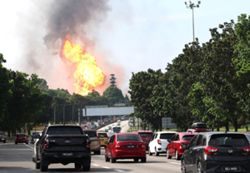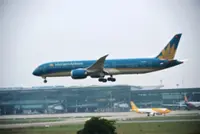
Anura Kumara Dissanayake waving as he leaves the Sri Lankan Election Commission after the announcement of the election results in Colombo, on Sept 22. - AP
COLOMBO: Sri Lanka’s leftist President-elect on Sept 22 invited his compatriots to help him “rewrite” history in the cash-strapped island nation after winning a vote coloured by discontent over an unprecedented financial crisis.
Anura Kumara Dissanayake, the 55-year-old leader of the People’s Liberation Front, was declared winner of the polls at the weekend with nearly 1.3 million more votes than his nearest rival.
The once-fringe leader, whose party won less than 4 per cent of the vote in parliamentary elections four years ago, saw a surge of support as the economic meltdown forced widespread hardships upon Sri Lankans.
“The dream we have nurtured for centuries is finally coming true,” he said in a statement shortly after the announcement.
“This victory belongs to all of us,” he added. “Millions of eyes filled with hope and expectation push us forward, and together, we stand ready to rewrite Sri Lankan history.”
Outgoing President Ranil Wickremesinghe – who took office at the peak of the 2022 economic collapse and imposed tough austerity policies per the terms of an International Monetary Fund (IMF) bailout – was a distant third in the contest with 17 per cent of the vote.
“History will judge my efforts, but I can confidently say that I did my best to stabilise the country during one of its darkest periods,” he said in a statement.
He congratulated Dissanayake on the win and said he was “confident” the politician would “steer Sri Lanka on a path of continued growth and stability”.
US Ambassador to Sri Lanka Julie Chung also passed on her congratulations, saying in a statement that Washington stood “ready to work together on shared priorities” with Dissanayake’s administration.
Dissanayake will be sworn in on Sept 23 at the colonial-era President Secretariat in Colombo, said election commission officials.
Economic issues dominated the eight-week campaign, with widespread public anger over the belt-tightening measures imposed by Wickremesinghe since the peak of the island nation’s bruising financial crisis.
Dissanayake will “not tear up” the IMF deal but will seek to modify it, a party politburo member told AFP.
“It is a binding document, but there is a provision to renegotiate,” said Bimal Ratnayake.
He said Dissanayake had vowed to reduce income taxes that were doubled by Wickremesinghe and slash sales taxes on food and medicines.
“We think we can get those reductions into the programme and continue with the four-year bailout programme,” he said.
Dissanayake’s once-marginal Marxist party led two failed uprisings in the 1970s and 1980s that left more than 80,000 people dead.
But Sri Lanka’s crisis has proven to be an opportunity for Dissanayake, whose popularity rocketed on his pledge to change the island’s “corrupt” political culture.
Around 76 per cent of Sri Lanka’s 17.1 million eligible voters cast their ballots in the Sept 21 polls.
Dissanayake’s party sought to reassure India that any administration he led would not be caught up in geopolitical rivalry between its northern neighbour and China, the country’s largest lender.
New Delhi has previously expressed concerns over what it sees as Beijing’s growing influence in Sri Lanka, which sits on vital shipping lanes criss-crossing the Indian Ocean.
Ratnayake told AFP: “Sri Lankan territory will not be used against any other nation.
“We are fully aware of the geopolitical situation in our region, but we will not participate.”
Indian Prime Minister Narendra Modi said on social media platform X that he was looking forward “to working closely with (Dissanayake) to further strengthen our multifaceted cooperation for the benefit of our people and the entire region”.
Wickremesinghe sought re-election to continue the austerity policies that stabilised the economy and ended months of food, fuel and medicine shortages during Sri Lanka’s economic meltdown.
His two years in office restored calm to the streets after civil unrest spurred by the downturn saw thousands storm the compound of his predecessor Gotabaya Rajapaksa, who then fled the country.
But Wickremesinghe’s tax hikes and other measures imposed under the US$2.9 billoion IMF rescue package he secured in 2023 left millions struggling to make ends meet.
Official data showed that Sri Lanka’s poverty rate doubled to 25 per cent between 2021 and 2022, adding more than 2.5 million people to those already living on less than US$3.65 a day.
Thousands of police were deployed to keep watch over voting on Sept 21.
A temporary curfew was imposed after polls closed, despite police reporting that there had been no violence during or after balloting.
No victory rallies or celebrations are permitted until a week after the final results are declared. - AFP









































